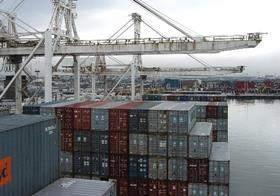
US congress is apparently uncertain about the feasibility of its plans to screen 100 per cent of cargo containers at ports of origin before entry to the US under the 9/11 Act.
According to US government security chief and reported by IFW, the July 2012 deadline cannot be met given the problems which have surfaced during a trial initiative.
“Uncertainty persists over how DHS (Department of Homeland Security) and CBP (Customs and Border Patrol) will fulfil the mandate for 100 per cent scanning, given that the feasibility remains unproven in light of the challenges CBP has faced implementing a pilot programmme,” said Stephen Caldwell Director, Homeland Security and Justice for GAO, in a statement to the House Subcommittee on Border and Maritime Security.
A pilot programme, the Secure Freight Initiative (SFI), was launched by CBP and the Department of State and Department of Energy in 2006.
However, participating ports were unable to achieve 100 per cent scanning of containers and CBP has now reduced the trial from six ports to one, the report said.
Uncertainly also persists regarding payment of the costs since the 9/11 Act does not specify who is to conduct the container scans, or who is to pay for scanning equipment or operations and maintenance, according to Caldwell.
Furthermore, Caldwell claims that the CBP has not yet conducted an assessment to determine whether 100 per cent scanning is feasible, nor to identify how to best achieve full scanning or the alternatives to 100 per cent scanning.
In light of the situation, Caldwell said he expects DHS will grant a blanket extension to all foreign ports until July 2014.



